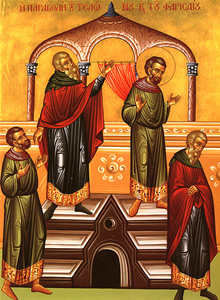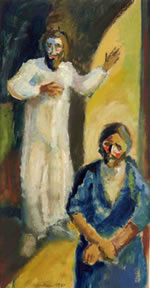Seven Little Words:
The Only Prayer You'll Ever Need
For Sunday October 28, 2007
Lectionary
Readings (Revised Common Lectionary, Year C)
Joel 2:23–32 or Jeremiah 14:7–10, 19–22
Psalm 65 or Psalm 84:1–7
2 Timothy 4:6–8, 16–18
Luke 18:9–14
 |
The Pharisee and the publican. |
About a month ago while I was exercising at the gym, I met a church friend I hadn't seen in several years. It was the first time I had spoken to Phil since he had left his disabled wife of thirty-plus years. After some superficial chit-chat, and figuring that many people probably thought he was a slime ball for doing such a thing, I asked Phil if he felt socially isolated. "Only by Christians," he said.
I admit that I was as tempted as anyone to shoot the wounded. Lucky for me, though, I had been thinking about Luke's Gospel for this week (18:9–14):
To some who were confident of their own righteousness and looked down on everybody else, Jesus told this parable: "Two men went up to the temple to pray, one a Pharisee and the other a tax collector. The Pharisee stood up and prayed about himself: 'God, I thank you that I am not like other men—robbers, evildoers, adulterers—or even like this tax collector. I fast twice a week and give a tenth of all I get.' But the tax collector stood at a distance. He would not even look up to heaven, but beat his breast and said, 'God, have mercy on me, a sinner.' I tell you that this man, rather than the other, went home justified before God. For everyone who exalts himself will be humbled, and he who humbles himself will be exalted."
By contrasting the two characters in this parable as polar opposites, Jesus sets in bold relief two ways of being religious, one of which is death-dealing, the other of which is life-giving.
The Pharisee was religiously righteous, the tax man was an extortionist for the Roman oppressors. The religious expert was smug, sanctimonious, and confident, the outsider was anxious, insecure and timid. The saint paraded to the temple, while the sinner "stood at a distance" as if his physical separation from the sacred temple expressed his spiritual alienation. The righteous man stood up, the sinful man looked down. In an act of incredible narcissism, the Pharisee prayed loudly "about himself;" the tax collector could barely pray at all. The Pharisee puffed out his chest in pride; the publican beat his breast in sorrow.
As in so many Jesus stories that subvert conventional wisdom, the parable punch line culminates with a reversal: the respectable, reputable believer—so competent and accomplished, the one who had done everything right—was rejected, whereas the secular sinner—disreputable, inadequate, and incompetent— "went home justified before God."
It would be hard to conjure a more earnest, conscientious, religious person than the Pharisee. He prayed often, he fasted regularly, and he gave generously to help the needy. His spiritual regimen was stringent. But he made two tragic mistakes in his religious life, one about himself, and one about other people, the combination of which is toxic to authentic spirituality.
First, the Pharisee "looked down on everybody else." Contempt for and disparagement of others lurk in the human heart; at least they do in mine, bubbling up all too easily and frequently. "I'm glad I don't have tattoos like that guy. . . . Thank God I'm not as narrow-minded as that conservative Republican." We imagine that in dissing others we validate ourselves, or that at least we will compare favorably. To disparage someone like my friend Phil as a sanctimonious hypocrite might feel good, but that's a dark place that Jesus warns us to avoid. We harm people when we do this to them. Even worse, while imagining that we elevate ourselves, we harm our own selves.
"We all stumble in many ways" (James 3:2), and for many reasons. What we all need when we flounder and fail is not moral condescension but human compassion, not humiliation but empathy, not shame but hope. I've always loved the tender wisdom of St. Maximos the Confessor (seventh century): "The person who has come to know the weakness of human nature has gained experience of divine power. Such a person never belittles anyone. . . . He knows that God is like a good and loving physician who heals with individual treatment each of those who are trying to make progress."
The flip side of condescension toward others is justification of yourself. This was the Pharisee's second mistake. The Pharisee thanked God that he was "not like other people"—a thief, an evildoer or an adulterer. His religious narcissism was a form of spiritual self-justification, of which there are almost endless permutations. It's scary to think about the many ways we try to justify ourselves before God, others, and our own selves.
 |
The Pharisee and the tax collector. |
We'll invoke almost anything to justify ourselves—intelligence (GPA and SAT), your alma mater ("This is where I went to school thirty years ago"), money ("I'm frugal toward myself and generous to others"), family ("Great kids!"), sports ("I'm in shape, you're a slob"), politics ("My vote is enlightened, yours is ideological"), and work ("I work at X; what do you do?"). A common form of self-justification invokes your zip code ("Where do you live?"), a thinly veiled insinuation that net worth is a reliable index of self worth. Ethical self-justification assures me that "I'm better than the next person."
At one time or another and to a greater or lesser degree I've tried these versions of self-justification; they don't work. Society is relentless in demanding proofs and justifications from us, and it's easy to take the bait, especially if you're an accomplished person with lots of ammunition who—in all modesty, right?—can rise to the challenge.
To live without self-justification makes me feel vulnerable and naked. But when you think about it, living without self-justifications is extraordinarily liberating. As soon as you accept that you're accepted by a good God, you never, for any reason, need to prove yourself. To get to that place Jesus says that we need only seven words—those mumbled by the tax collector as he stood at a distance and stared at the ground: "God, have mercy on me, a sinner." The moment we breathe those words and cast our unadorned selves upon God, we experience His love without conditions or limits.
Correctly understood, and spoken from the heart, that's the most important prayer anyone can utter, and in a sense the only prayer you'll ever need. Why? Because it proceeds from a clear-eyed appraisal of our human condition and, more importantly, from confidence in the character of a God who welcomes the secular sinner—and even the self-righteous saint.
For further reflection
* The early monastics on judging others: "The monk, says Moses, must never judge his neighbor at all in any way whatever." "They said of Abba Macarius that just as God protects the world, so Abba Macarius would cover the faults he saw, as though he did not see them, and those he heard, as though he did not hear them."
* On self-justification: John the Dwarf once said, "We have put aside the easy burden, which is self-accusation, and weighed ourselves down with the heavy one, self-justification."
* Consider Mrs. Turpin from the short story "Revelation" by Flannery O'Connor. Mrs. Turpin was a good, decent, upright, and proud woman who did everything right, except that she was a self-righteous racist. She was a person, writes O'Connor, who when she entered heaven needed "even her virtues burned away."
* Consider: the self-righteous Pharisee was wrong about himself, about others, and about God.





